With the Islanders looking less and less like a Cup contender as the 2015-16 season winds to a close, a familiar feeling has crept up within the team’s fanbase. The organization may be wasting the prime of John Tavares’ career.
Since drafting the wunderkind in 2009, the Islanders have made the playoffs two times in six seasons. They haven’t won a single series. The furthest this team has advanced with one of the best centers in the league – I’d quickly place him in the top-five – is a game seven loss in last year’s Eastern Conference quarterfinals.
That is not an indictment of Tavares. That is an indictment of the players around him.
Though they’ve long envisioned pairing Tavares with a star winger, the Islanders haven’t been able to see it through. They’ve come up empty-handed in free agency, struggled to make a splash in the trade market and simply fallen short in the draft. Through nearly seven full seasons in the NHL, Tavares’ best linemates have been Kyle Okposo, who is likely headed for greener pastures this summer, and Thomas Vanek, who forced his way out of Nassau County less than 50 games into his Islander career.
And neither of those two, by the way, are true superstars. They’re supplemental pieces more than foundational talents, guys who can help shoulder the load but can’t carry it themselves. Tavares, on the other hand, is the kind of player who propels those around him, but it’s hard to shake the feeling that those around him are only holding him back.
Roster Construction Around John Tavares
This Islanders team, as currently constructed, is not making a run at the Stanley Cup. The gap between Tavares and everyone else is just too wide. Garth Snow’s Hail-Mary acquisition of Shane Prince at the deadline followed by Jack Capuano’s insertion of Prince on the team’s first line made that painfully clear. Knowing they were short up front, the GM and the coach tried to catch lightning in a bottle. So far, the move has flopped.
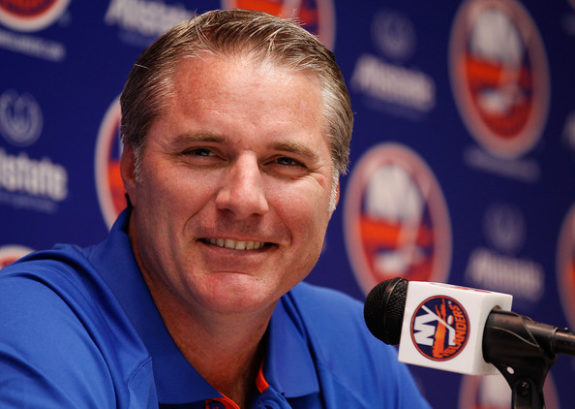
That’s not necessarily a trend, though. It’s not as if the Isles have tried to cut corners since drafting Tavares by searching for diamonds in the rough. Snow, remember, offered Vanek a long-term deal reportedly worth more than $7 million per season ahead of the 2014 trade deadline, but Vanek turned it down and signed a few months later in Minnesota for fewer years and less money. Such is the nature of building a small-market team with a losing reputation.
Tavares, almost singlehandedly, has turned that reputation around. But the fact remains that the Isles are the second favorite team in the city they call home; were recently forced to relocate because their arena was falling apart (and, perhaps more damning, because local politicians decided it wasn’t worth keeping them around); and now play in an arena condemnable in its own right. When recruiting free agents, Snow is playing catch-up from the outset.
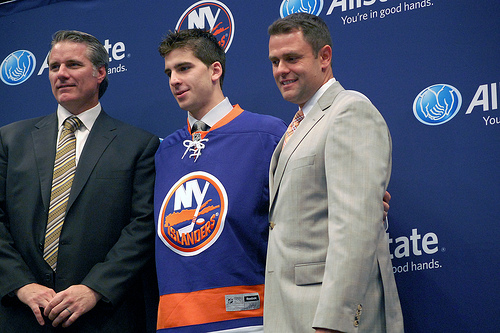
To make up for this disadvantage, it’s especially important for the Islanders to hit on high draft picks – which they’ve had plenty of during Tavares’ tenure with the team. Snow hasn’t necessarily swung and missed on any of his post-2009 first-round selections, but he’s yet to hit a real homerun either. He passed on Vladimir Tarasenko and Justin Faulk in 2010, Johnny Gaudreau in 2011 (although who didn’t?), and Filip Forsberg in 2012. The players he took instead – guys like Brock Nelson and Ryan Strome – have become solid contributors, but the Isles, given their limitations elsewhere, need more from the draft than what they’ve extracted of late.
Stagnancy in Brooklyn, Despite John Tavares
What the Islanders have become is a team that’s one big piece short. They’ll remain competitive as long as Tavares sticks around and the surrounding core remains in place, but they won’t truly enter the league’s elite. There are too many great players stockpiled on too few teams for the Isles to crack this upper echelon the way they’re presently assembled. They’ve approached it the past couple seasons, but they’ve lacked the credentials to gain entry. “Sorry,” the gatekeepers have seemed to say. “Try again next year.”
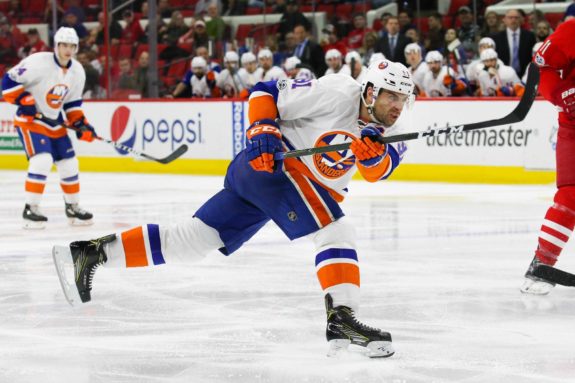
One has to wonder if the Isles’ status as a middle-class organization is beginning to weigh on Tavares’ mind. He signed an extremely team-friendly contract in 2011 in the hope the Islanders could build a Cup-contending roster around him. So far, it hasn’t happened. Instead, he finds himself on a team stuck somewhere between good and great, without the type of NHL-ready prospect pool or free-agent appeal that suggests a breakthrough’s on the horizon.
If the Islanders continue to tread water through the duration of Tavares’ contract, expect the four-time All-Star to test the free agent market at the conclusion of the 2017-18 season. He’ll be 28 years old when the 2018-19 season begins – which is about the time NHL players begin to decline – and as loyal as he seems to be to this organization, he is guided first and foremost by his desire to win a Stanley Cup. If he feels that dream’s slipping away in Brooklyn, he won’t hesitate to sign elsewhere.
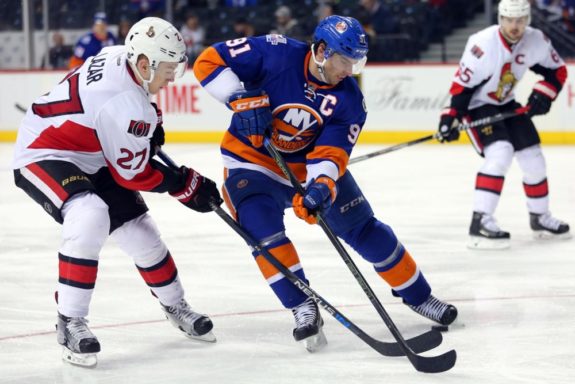
A player of Tavares’ stature doesn’t come around often. Of the 200-plus players picked in an average NHL draft, one, maybe one, has his type of transcendent, franchise-altering talent. When a team is lucky enough to land such a star, it must do all it can to maximize his impact. That means assembling the best possible supporting cast through free agency, trades and the draft picks that follow. With shrewd decision-making and a little bit of luck, success tends to follow in waves.
John Tavares’ Comparables
Few players since the turn of the century have generated as much draft hype as Tavares did in 2009. Aside from last year’s Connor McDavid/Jack Eichel ballyhoo, there was Steven Stamkos in 2008, Patrick Kane in 2007, Sidney Crosby in 2005, Alex Ovechkin and Evgeni Malkin in 2004, Rick Nash in 2001 and Ilya Kovalchuk in 2000. That’s it.
Boy, look at them now. Stamkos’ Lightning advanced to the Stanley Cup Finals last year, Kane’s Blackhawks have become a flat-out dynasty, Crosby’s and Malkin’s Penguins have been the Blackhawks of the East, and Ovechkin’s Capitals have been a regular season force for the better part of a decade. As for Nash and Kovalchuk? After wasting away on mediocre, small-market teams in Columbus and Atlanta through the early stages of their careers – sound familiar? – they both orchestrated their way out.
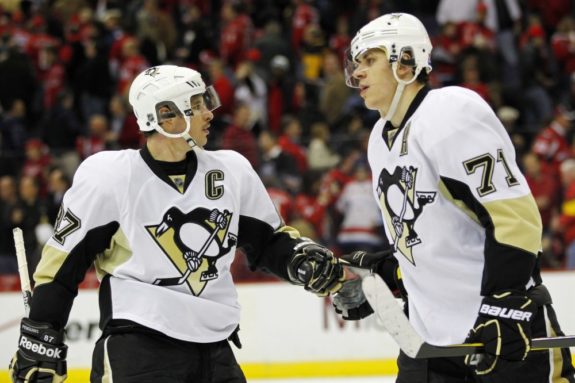
But let’s return to those wunderkinds whose teams have found legitimate NHL success. In fact, let’s expand the group to include the top player(s) to emerge out of each draft from 2000 to 2009, observing a common standard of excellence across the board. With due respect to some worthy omissions – we had to draw the line somewhere – the list looks like this:
- 2000: Henrik Lundqvist
- 2001: Ilya Kovalchuk
- 2002: Rick Nash, Duncan Keith
- 2003: Marc-Andre Fleury, Eric Staal, Zach Parise, Ryan Getzlaf, Corey Perry, Patrice Bergeron, Shea Weber
- 2004: Alex Ovechkin, Evgeni Malkin
- 2005: Sidney Crosby, Carey Price, Anze Kopitar, Jonathan Quick
- 2006: Jonathan Toews, Nicklas Backstrom, Claude Giroux
- 2007: Patrick Kane, P.K. Subban, Jamie Benn
- 2008: Steven Stamkos, Drew Doughty, Erik Karlsson
- 2009: John Tavares, Victor Hedman, Oliver Ekman-Larsson
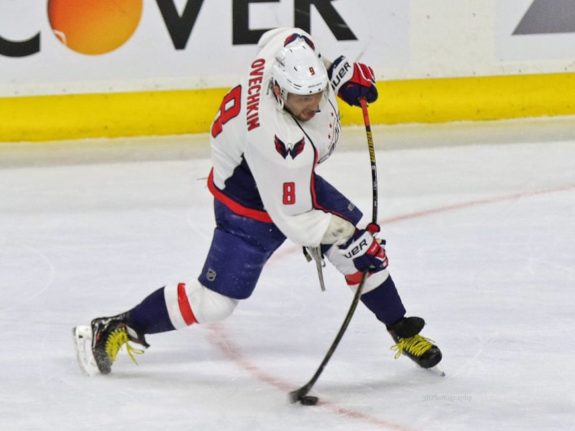
You can quibble about who’s on that list that shouldn’t be, and who’s not on it that should be. It’s probably too inclusive if anything, as players like Nash, Parise and Giroux don’t quite belong in the same breath as Ovechkin, Crosby and Kane. But what you simply can’t dispute is that Tavares belongs there as much as anyone. He is hands down one of the best players in the NHL.
But look how he stacks up to his peers in terms of his team’s success. Every single one of the aforementioned 28 players has advanced past the first round of the NHL playoffs with the exception of Tavares and Benn (and Benn is likely on his way this spring.) Why? Because they’ve all been on teams – at least for a season or two – that relied on more than a single superstar. Tavares? Hardly.
The Isles’ Roadmap with John Tavares
To be fair, the Islanders haven’t been as fortunate in the draft as teams like the Penguins, who won a lottery to select Crosby in 2005; the Blackhawks, who watched Toews fall into their laps in 2006; or the Ducks, who snagged both Getzlaf and Perry with late first-round picks in 2003. Neither have they been as deep-pocketed in free agency as the Rangers, Flyers and Capitals.
But there are teams represented on that list who’ve achieved playoff success without improbable luck in the draft and free-spending ownership. Small-market teams, too. The Hurricanes won the Stanley Cup in 2006. The Coyotes advanced to the Western Conference finals in 2012, while the Devils made it all the way to the Cup Finals that same year. And the Lightning followed suit just a season ago.
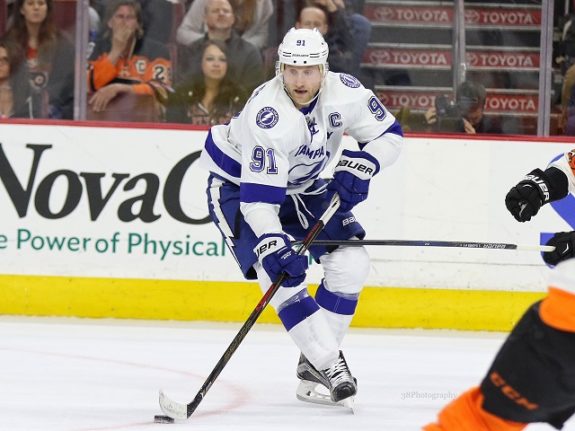
Those teams acquired stars through the draft, and filled out their rosters with clever trades and savvy free-agent signings. Snow deserves some credit in the latter endeavor for his acquisitions of Nick Leddy, Johnny Boychuk and Jaroslav Halak in the 2014 offseason, but also a heavy load of blame for the 2013 Thomas Vanek trade that sacrificed valuable draft assets (and a proven goal scorer in Matt Moulson.) Meanwhile, in the draft, Snow has been good, but hardly good enough.
It is this lack of high-end, complementary talent that’s seen the Islanders squander the opportunity at hand. It’s as if the organization was gifted a premium sports car and has decided to fill it, year after year, with regular gasoline. It’s a disservice to Tavares and a disservice to the fans, who, for the first time since the years of Mike Bossy, are witnessing a generational superstar in Islanders’ orange and blue. (Bossy, of course, had more than a few stars to run with.)
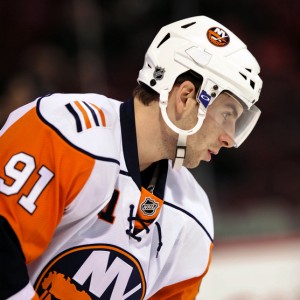
With the organization unlikely to land a top player through free agency and most if its blue-chip prospects – Michael Dal Colle, Anthony Beauvillier, Mathew Barzal – still a few years away, the only way for Snow to bring in a worthy sidekick for John Tavares is via a trade. And unlike Vanek, Snow needs to target a player with considerable term left on his contract. If we learned anything from that fiasco, after all, it’s that out-of-town stars simply won’t commit to this organization of their own accord.
A Final Word on John Tavares
Maybe Tavares has more faith in the Islanders’ long-term vision than we realize. Surely Snow has stressed to him, time and time again, that the organization is building toward something great. But right now, the team has plateaued. They’re a little more than halfway to the NHL’s summit and lack the resources for the final ascent. If they can’t find reinforcements in the next couple seasons, they’ll likely stall out right where they are: above most of the League, but well below the lot of it that matters. And by that point, Tavares may decide to finish the climb with a stronger team.
So those are the stakes for the Islanders this season and the two after it. The organization was given a prized asset nearly seven years ago, and has yet to harness its value. Where teams around them have parlayed can’t-miss picks into championships, the Isles have turned John Tavares into nothing more than a couple of early playoff exits. There’s still time to change the script, but the Islanders are running out of time. “The Next One,” as he was known in his Junior days, may soon be on to the next one.
This article was originally published in March, 2016.